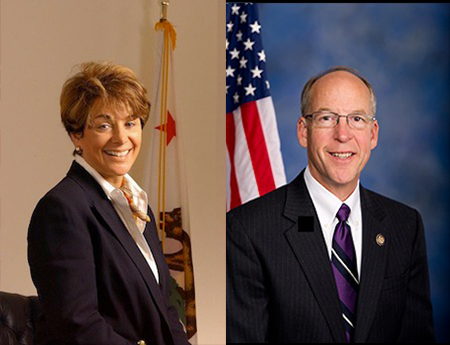House Communications Subcommittee Passes STELA

The smarter way to stay on top of broadcasting and cable industry. Sign up below
You are now subscribed
Your newsletter sign-up was successful
The House Communications Subcommittee Tuesday approved a bipartisan version of the STELA reauthorization bill that leaves open the question of blocking the FCC's JSA attribution change—teed up for a March 31 vote—and allows for the sunset of the FCC's set-top integration ban, but also allows it to reimpose it.
The new version of the draft bill was adopted unanimously as an amendment co-sponsored by chairman Greg Walden (R-Ore.) and ranking member Anna Eshoo (D-Calif.). The bill now moves to the full committee.
The Republican-led draft initially had a provision preventing the FCC from taking any action on making joint sales agreements attributable unless it was in the context of an overall resolution of the overdue 2010 quadrennial rule review. That provision remains in the bill, but has been put in brackets, which is a way to say that agreement has yet to be reached, but still allow the draft to get subcommittee approval, signaling there will be further discussion of that element in the full committee markup.
Walden said he still believed it should be part of the bill, while Eshoo agreed that the FCC needs to complete its quadrennial review and appreciated the chairman's willingness to continue to talk about how to achieve that.
The draft's provision eliminating the FCC's integration ban on set-tops was amended to say that the FCC still has the power to reinstate the ban on any successor to the CableCARD regime.
The markup was relatively short and almost remarkably free of contentiousness.
Various amendments dealing with possible video market changes were offered and withdrawn, which is a way to be on the record with the concern without holding up the process. Chairman Walden's response was to acknowledge the importance of the issue but suggest it was better deal with in an update to communications law the subcommittee has placed on a separate track. His goal all along was to keep STELA free of video reforms that could impede its must-passage by the end of the year.
The smarter way to stay on top of broadcasting and cable industry. Sign up below
Eshoo offered and withdrew an amendment asking the FCC to study whether blocking online access to broadcast content during a retransmission consent impasse qualified as not negotiating in good faith. She used that as an opportunity to talk about the CBS/Time Warner Cable stalemate that involved CBS blocking online access to TWC broadband subs.
She also hammered retrans payments, saying it was an unsustainable business model, a "racket" and a "gun to the head." She recognized that those concerns were probably not going to be dealt with in STELA, but said they needed to be dealt with nonetheless.
Rep. Steve Scalise (R-La.), who like Eshoo had wanted more video reforming in STELA, offered and withdrew an amendment that would, among other things, have reinstated a provision in the original draft that would have removed the requirement that retrans stations be placed on cable's must-buy basic tier.
In general, the compromise draft drew bipartisan praise. Rep. Henry Waxman (D-Calif.), ranking member of the full committee, said he was pleased with the integration ban portion of the bill and its inclusion of a "trust but verify" approach by giving the FCC the power to reimpose the ban. He pointed out that the CableCARD regime had produced energy-inefficient boxes and said the bill would allow cable ops to produce more energy-efficient equipment without "restricting the FCC's ability to readopt the integration ban in future if cable ops act to thwart competition."
“We applaud Chairmen Upton and Walden, Ranking Members Waxman and Eshoo and the entire subcommittee for their bipartisan efforts to advance the STELA draft on to the full committee,” said National Cable & Telecommunications Association president Michael Powell. “We are especially pleased that committee members have worked collaboratively to eliminate the FCC’s Integration Ban, an unnecessary rule that has increased significantly both the cost and energy consumption of cable leased set-top boxes while offering no consumer benefit. We look forward to working with the full committee on this important legislation.”
The American Cable Association was less sanguine about the vote, given the provision it says gives TV stations a statutory right to coordinate retrans negotiations.
That provision would prevent coordinated retrans in a market unless the stations were co-owned or attributable under ownership rules as co-owned, but it would give those stations the right to coordinate retans, something ACA strongly opposes.
“Not surprisingly, ACA members and the millions of customers they serve are quite distressed with Section 3 of the discussion draft passed today in that it provides broadcasters with a statutory right to engage in this highly dubious practice,” said ACA president Matt Polka.
“We appreciate that Energy & Commerce Committee Democrats, especially Rep. Henry Waxman and Rep. Anna G. Eshoo, highlighted this section of the bill as one that needs to be changed before passage by the full committee. The commitment of the Subcommittee’s top Republican, Chairman Greg Walden, to try to pass a bipartisan bill was appreciated."
Contributing editor John Eggerton has been an editor and/or writer on media regulation, legislation and policy for over four decades, including covering the FCC, FTC, Congress, the major media trade associations, and the federal courts. In addition to Multichannel News and Broadcasting + Cable, his work has appeared in Radio World, TV Technology, TV Fax, This Week in Consumer Electronics, Variety and the Encyclopedia Britannica.

